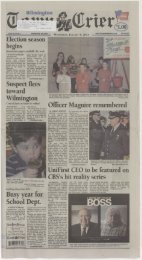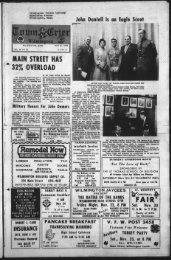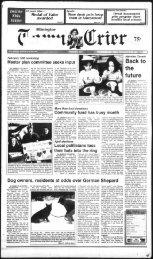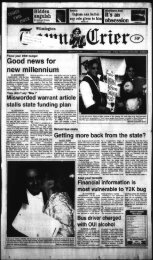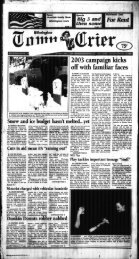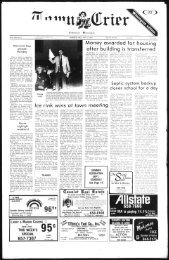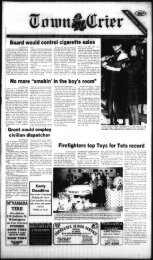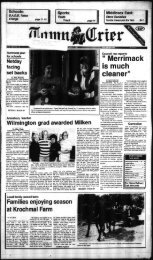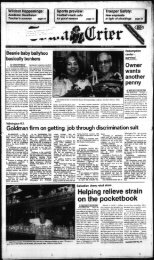I The Frank Kelley Roast - Wilmington Town Crier
I The Frank Kelley Roast - Wilmington Town Crier
I The Frank Kelley Roast - Wilmington Town Crier
You also want an ePaper? Increase the reach of your titles
YUMPU automatically turns print PDFs into web optimized ePapers that Google loves.
Smallpox was a<br />
problem in 1780<br />
<strong>Wilmington</strong><br />
by Capt. LARZ NEILSON<br />
In 1780 <strong>Wilmington</strong> was a<br />
small town of less than 700 peo-<br />
ple, all of whom were engaged<br />
in the serious business of mak-<br />
ing a living while inflation<br />
wracked the land. <strong>The</strong> inflation<br />
was being caused by the<br />
Revolution then being fought<br />
against their mother country -<br />
England.<br />
<strong>The</strong>re were four school, the<br />
north, south, east and west.<br />
<strong>The</strong> schools operated only dur-<br />
ing the winter season, and were<br />
for boys only. Girls, if they were<br />
to learn to read did so at the<br />
family hearth.<br />
As far as is known there were<br />
no Dame Schools. <strong>The</strong>re was<br />
one in Billerica. A Dame School<br />
was a place operated by an edu-<br />
cated woman where girls could<br />
learn to read and write.<br />
It is possible that Mrs.<br />
Dorothy Morrill could read and<br />
write, she was the wife of the<br />
minister, and her father was the<br />
minister in Billerica. Possibly<br />
Dorothy had attended the<br />
Dame School. <strong>The</strong>re is a docu-<br />
ment in the state archive which<br />
may have been written by<br />
Dorothy.<br />
Generally speaking, though,<br />
when a woman was required to<br />
attest to a document she did so<br />
by making a mark, as it was<br />
called - an x, really written by<br />
someone else, but with the lady<br />
also having her hand on the<br />
quill.<br />
Such was the case of the<br />
widow Abigail Beard. She had,<br />
a year earlier, signed a docu-<br />
ment with an "x."<br />
To tell the story of that docu-<br />
ment means that the story of<br />
smallpox should be told.<br />
Small pox no longer exists, in<br />
this world. It is now twenty five<br />
years since the World Health<br />
Organization proclaimed that<br />
the last case had been cured,<br />
and the world would longer<br />
have to suffer from that dis-<br />
ease.<br />
Most of those alive today have<br />
been inoculated, as a young<br />
person, against the small pox.<br />
<strong>The</strong> inoculation was adminis-<br />
tered before the time of enter-<br />
ing school or kindergarten, and<br />
in effect, the results of the work<br />
of an English man of some 175<br />
or 185 years ago by the name of<br />
Jenner. He had noticed that<br />
women who milked cows never<br />
suffered from small pox. <strong>The</strong>y<br />
had been exposed to a milder<br />
form of the disease - cow pox,<br />
and were immune to small pox.<br />
One hundred years prior to<br />
that, the small pox was being<br />
prevented in part, by inocula-<br />
tion with a virus of the disease.<br />
To tell of that is to tell of the<br />
family of the Rev. Cotton<br />
Mather, and Dr. Zabdiel<br />
Boylston, both of Boston.<br />
<strong>The</strong> first small pox, in<br />
Massachusetts, was responsible<br />
for the killing of thousands of<br />
aboriginal inhabitants - called<br />
Indians by the white men. It<br />
may well have been earlier, but<br />
about 1615 or 1616 there were<br />
thousands who were killed,<br />
from an infection that came<br />
from someone fishing smack in<br />
what is now Gloucester harbor,<br />
or from a French exploring ves-<br />
sel, from Canada, or some<br />
English vessel, or otherwise.<br />
<strong>The</strong> red men died by the thou-<br />
sands. When the Puritans land-<br />
ed a few years later there were<br />
only a few still alive, in what is<br />
4ow Eastern Massachusetts.<br />
Massasoit, Chief of the<br />
Wampanoags, signed a treaty .<br />
with the Pilgrims in 1621. As he<br />
did so he is reported to have<br />
said: "Englishmen, take the<br />
fend, for none is left to occupy<br />
it <strong>The</strong> Great Spirit ... has<br />
swept its people from the face<br />
•f the earth."<br />
I Small pox, or some other<br />
plague of the white man, had<br />
taken its toll of the Wampanoag<br />
Not that the Indians were<br />
alone, in suffering form small<br />
pox. <strong>The</strong> white settlers, too,<br />
died from the disease. IN the<br />
cemetery beside the<br />
Congregational Church in<br />
<strong>Wilmington</strong> are gravestones<br />
telling of the death of four<br />
Harnden children, in the early<br />
days of August, 1737. <strong>The</strong>y all<br />
died within a period of eight<br />
days.<br />
Probably they died from small<br />
pox. Possibly the cause was<br />
some other affliction, for there<br />
were other diseases in those<br />
days which killed off the popu-<br />
lation.<br />
Sometime a=fter 1700 the Rev.<br />
Cotton Mather of Boston<br />
learned that in Turkey people<br />
were being inoculated against<br />
the small pox, by being exposed<br />
to the virus, scratched into the<br />
skin with a pin point.<br />
About 1720 the Rev. Mr.<br />
Mather proposed that the peo-<br />
ple of boston be so inoculated.<br />
<strong>The</strong> people of Boston did not<br />
take kindly to the suggestion. If<br />
a person was inoculated with<br />
the smallpox virus he might or<br />
he might not live. If he did, he<br />
never got the disease, but the<br />
cure was almost as bad as the<br />
bite.<br />
<strong>The</strong> provincial legislature<br />
soon passed laws, preventing<br />
inoculation with small pox<br />
virus.<br />
In 1721 there was an epidemic<br />
of~ small pox. This was five<br />
years after the Rev. Mr. Mather<br />
had begun to preach about<br />
inoculation as a safeguard.<br />
Cotton convinced Dr. Boylston,<br />
but he was alone among the<br />
physicians of Boston. A real<br />
controversy arose, among the<br />
physicians. <strong>The</strong> records may be<br />
found in the archives of the<br />
Massachusetts Historical<br />
Society.<br />
Cotton Mather inoculated his<br />
son against small pox, and two<br />
black slaves. <strong>The</strong> Rev. Increase<br />
Mather, who was president of<br />
Harvard, and the father of<br />
Cotton, took the past of his son,<br />
as did several other clergymen.<br />
Many other clergymen<br />
protested, loudly. To inoculate,<br />
they said, was to violate God's<br />
law for man. <strong>The</strong>y were joined<br />
by many physicians. Someone<br />
threw a bomb through the win-<br />
dow of the home of the Rev.<br />
Cotton Mather.<br />
<strong>The</strong> law, in the statehouse,<br />
against inoculation held. It was<br />
thus in Massachusetts during<br />
the years of the Revolution.<br />
In 1778 small pox again made<br />
its appearance. Among those<br />
affected was the family of John<br />
Jaquith, Jr., husband and wife.<br />
John lived on what is now<br />
Aldrich Road, or on Forest<br />
Street, near the present<br />
Episcopal Church. He was a<br />
cousin of Deacon Benjamin<br />
Jaquith, who lived nearby and<br />
was the first selectman of<br />
<strong>Wilmington</strong>. John had an<br />
important part in the military<br />
affairs of the town, and.served<br />
on the committee on Safety and<br />
Correspondence, a committee<br />
of great importance.<br />
When John died some years<br />
later, he was known as Major<br />
John Jaquith.<br />
<strong>The</strong>re was quite a lively town<br />
meeting. Major Timothy<br />
Walker, who was the town trea-<br />
surer, was the Moderator.<br />
<strong>The</strong> town meeting was asked<br />
if the town should inoculate,<br />
and as the record has it, "it<br />
past in the Negative." <strong>The</strong>re<br />
would be no inoculation in<br />
<strong>Wilmington</strong>.<br />
<strong>The</strong> town then voted to "use<br />
their utmost endeavours" to<br />
prevent the spreading of "small<br />
pox" at "this season of ye year."<br />
<strong>The</strong>n it voted to prosecute any<br />
"manner of persons that shall<br />
willfully or carelessly be<br />
Instrumental of Spreading the<br />
Small pox in this <strong>Town</strong>; either<br />
by Inoculation or nay other way<br />
Miceli to hold office hours<br />
i Representative James Miceli<br />
Will be holding office hours for<br />
le <strong>Town</strong> of <strong>Wilmington</strong>,<br />
londay August 22nd from 9:30 -<br />
la.m. at the <strong>Wilmington</strong> Senior<br />
nter and also from 7:30 • I<br />
at the <strong>Wilmington</strong> <strong>Town</strong><br />
A<br />
Representative James Miceli<br />
will be holding office hours for<br />
the <strong>Town</strong> of Tewksbury,<br />
Tuesday August 23rd from 9:30 -<br />
11 a.m. at the Tewksbury Senior<br />
Center and also from 7:30 - 9<br />
p.m. at the Tewksbury <strong>Town</strong><br />
Hall.<br />
TOWN CRIER - WEDNESDAY, AUGUST 10, 2005<br />
Finally, came the vote to in<br />
effect ostracize the family of<br />
John Jaquith, Jr.<br />
Eight or nine months later<br />
small pox was again debated in<br />
town meeting. <strong>The</strong> discussion<br />
this time was whether or not<br />
the town should build a house<br />
for people with small pox.<br />
Other towns had such a house.<br />
It was called a "pest house."<br />
<strong>Wilmington</strong> had none. <strong>The</strong> town<br />
voted against having such a<br />
house.<br />
<strong>The</strong>n it was discovered that<br />
the town meeting vote was not<br />
valid. <strong>The</strong> constable, by law,<br />
was supposed to "warn" the<br />
inhabitants of a town meeting,<br />
and this, it was said, had not<br />
been done properly.<br />
On January 12, 1779, Reuben<br />
Butters being the Moderator,<br />
the town again voted in the neg-<br />
ative, for a small pox house.<br />
Ten days later small pox was<br />
discovered, in the family of<br />
Jacob and Abigail Beard.<br />
<strong>The</strong> Beard family, had started<br />
in Billerica, and had operated a<br />
mill on the Shawsheen River,<br />
they lived in the part of<br />
<strong>Wilmington</strong> which is the<br />
"thumb" on the modern maps<br />
and along Lake Street. <strong>The</strong> late<br />
Harold Melzar used to say his<br />
home was built by a Beard in<br />
1744.<br />
But the family of Jacob and<br />
Abigail Beard did not occupy<br />
such a home. <strong>The</strong>y were, they<br />
said, "under poor circum-<br />
stances in the World" and thus<br />
unable to provide for them-<br />
selves, in their extremity, and<br />
"do cast ourselves and what lit-<br />
tle estate we have in this world<br />
upon your care and provi-<br />
dence." Abigail, for her part,<br />
signed the paper with a mark.<br />
<strong>The</strong> records are not entirely<br />
clear. No death of Jacob Beard<br />
is to be found recorded, but<br />
clearly someone did die, for<br />
September 13, 1779 the town<br />
meeting voted Major Timothy<br />
Walker be "authorized and<br />
appointed to settle the affair<br />
with the Widow Beard, in<br />
regard to the small pox, and to<br />
adjust all accounts and pay the<br />
same."<br />
<strong>The</strong>n, on November 15 the<br />
town voted that the sum of 266<br />
pounds be assessed "to pay all<br />
the charges of the small pox."<br />
It never did vote to allow the<br />
family of John Jaquith to leave<br />
their home, or to allow people<br />
to visit them.<br />
But, in 1780 John Jaquith was<br />
again in the town meeting, and<br />
he was voted a tithing man, in<br />
<strong>Wilmington</strong>, along with Peter<br />
Cornell, Jr. and James<br />
Pearson. Evidently he had<br />
recovered.<br />
ALL JEWELRY REPAIR<br />
Same day service available<br />
Jeweler on premises<br />
Remounts & custom design<br />
Fine selection of jewelry & diamonds<br />
^Bernard's Jewelers<br />
2144 Main St. • TEWKSBURY<br />
978-9S8-S884<br />
I or mil -|> in the Jewelers Building, Boston<br />
GREAT SERVICE & GREAT PRICES<br />
ALL THE TIME!!<br />
HOCKEY • FIGURE • INLINE • SPEED • ROLLER<br />
CLOTHING AND EQUIPMENT<br />
EMBROIDERY<br />
PERSONAL, TEAM, CORPORATE<br />
ALL REPAIRS<br />
DONE ON<br />
LOCATION<br />
CHRISTINE COOKE'S<br />
LEARN TO SKATE!!!<br />
ALL AGES, HOCKEY<br />
AND FIGURE<br />
978-556-9484<br />
446 MAIN STREET • WILMINGTON, MA<br />
877-SK8-SHOP 978-657-7586<br />
Fl AFTER HOURS SALE!<br />
SHERWIN<br />
WILLIAMS<br />
EVERYTHING IN THE STORE!*<br />
Whether your next project is inside or out, you'll find big savings<br />
on everything you need at your neighborhood<br />
Sherwin-Williams store!<br />
•a? WILMINGTON<br />
188 Main Street • 978-658-3411 Ask How. Ask Now. Ask Sherwin-Williams.<br />
Visit us at shefwtn-wllliams.com<br />
0(lwviM8/iM»»OT6«0« Rets* vn only M savsigs are on regular pro* Lai* 15 ojfcns per customer 'fjctudes Duratrmc* fadenor Coawig Duration Home'" Goto 'o Go"" pan samp*"<br />
COLOR Fan (lacks PurdydB brushes and Purdy



